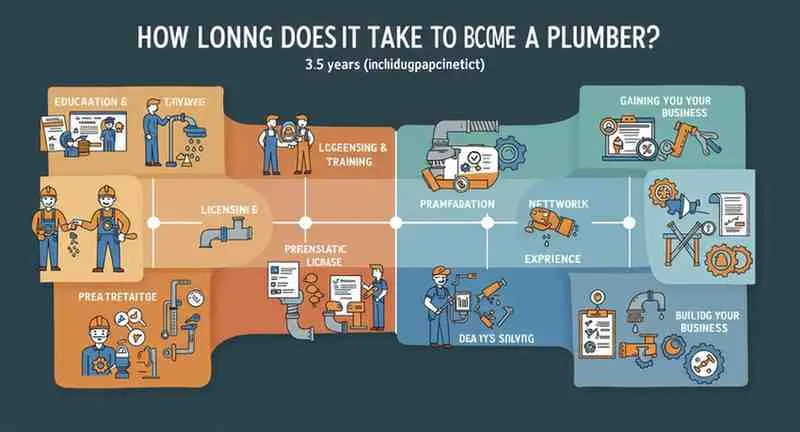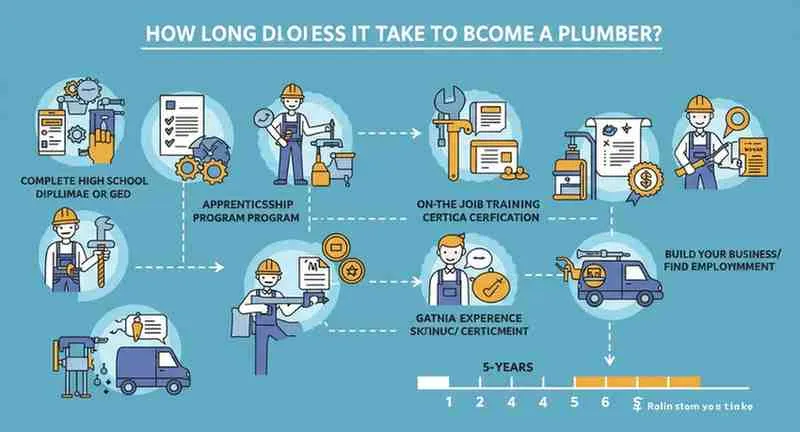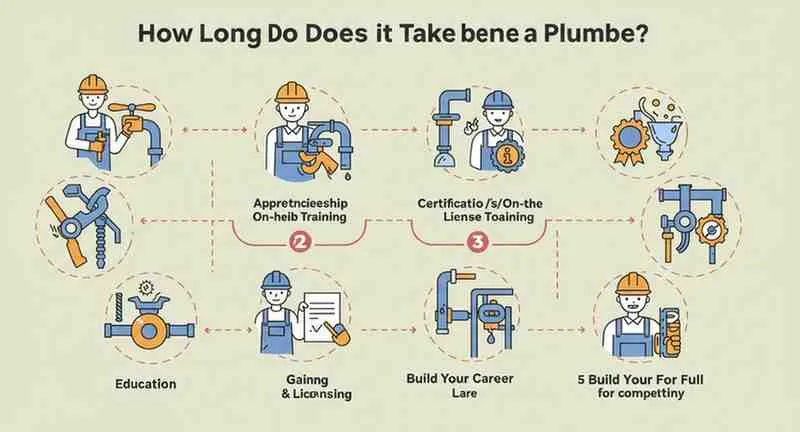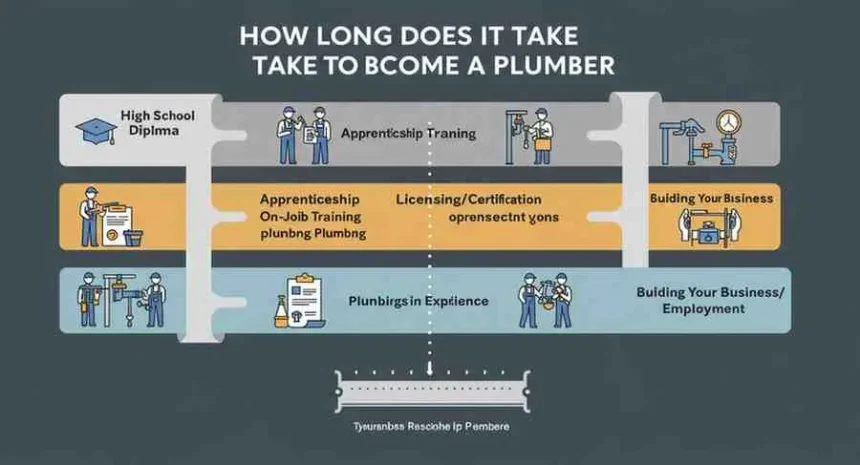Understanding How Long Does It Take to Become a Plumber is essential for prospective tradespeople who need to align their educational, financial, and personal commitments with the demands of the profession. Accurately forecasting the duration of training and qualification phases prevents unexpected delays, budget overruns, and career setbacks.
By mapping out each stage—from initial coursework and on-the-job training through to licensure—students and apprentices can make informed decisions about program selection, part-time work, and family obligations. Clear timelines also help educational institutions and employers design curricula and apprenticeship schedules that meet both regulatory requirements and industry needs, ensuring a steady pipeline of qualified plumbers ready to enter the workforce.
Key Statistics
Several authoritative sources outline the baseline requirements for plumbing training and apprenticeship. Trade school certificates typically require between six months and two years of study, depending on program intensity and credit load. Apprenticeships, which combine paid work experience with classroom instruction, generally span four to five years and encompass approximately 10,000 on-the-job hours plus 1,000 hours of technical instruction.
Following apprenticeship completion, exam preparation and application processes can add an additional six to twelve months before full journeyman licensure is granted. These figures frame the overall range of How Long Does It Take to Become a Plumber and underscore the multi-year commitment necessary to achieve professional status in most U.S. jurisdictions.
Education Paths Explained
Educational prerequisites for plumbing careers vary by state and institution, but most students begin with one of three primary routes. Certificate programs and pre-apprenticeships offer focused technical training in fundamental plumbing principles, safety protocols, and tool usage over a four- to twenty-four-month period. Associate degree programs in plumbing technology, delivered by community colleges, extend over two years and integrate general education courses with specialized plumbing instruction.

Finally, accelerated or bootcamp-style courses condense essential skills into three to four months of intensive study, appealing to students seeking rapid entry into apprenticeship placements. Each path contributes differently to the total timeline for How Long Does It Take to Become a Plumber, and selection should align with individual career goals, budget constraints, and prior experience.
| Education Path | Typical Duration | Key Focus Areas |
|---|---|---|
| Certificate Program | 4–24 months | Safety, tools, basic plumbing skills |
| Associate Degree | 2 years | Plumbing principles, general studies |
| Fast-Track Bootcamp | 3–4 months | Intensive hands-on training |
Apprenticeship Timeline
Apprenticeships represent the core phase in professional plumbing preparation, blending real-world work assignments with structured classroom learning. Participants are typically required to log approximately 2,000 on-the-job hours per year over the course of a four- to five-year program, while also completing at least 144 hours of technical instruction annually.
On-the-job tasks progress in complexity from basic tool handling and fixture installation in the first year to advanced diagnostics, commercial system layouts, and supervisory responsibilities in later years. This combination ensures that apprentices acquire both the manual dexterity and theoretical knowledge necessary for journeyman-level competence and frames the most time-consuming segment of How Long Does It Take to Become a Plumber.
Licensure and Certification
Upon completing apprenticeship requirements, candidates enter the licensure phase, which encompasses exam preparation, application submission, and final testing. Depending on state regulations, this stage can extend from six months up to a year. Preparation involves in-depth study of local plumbing codes, business law, safety standards, and blueprint reading.
Candidates must gather documentation of completed work hours, academic transcripts, and often letters of recommendation before scheduling the journeyman examination. Passing this exam grants full licensure, permitting independent practice and the ability to supervise apprentices, thereby concluding the primary timeline of How Long Does It Take to Become a Plumber.
Common Misconceptions
Myth #1: “It’s Just Two Years Max”
Many assume that vocational certificates or associate degrees alone suffice for full plumber certification. In reality, these educational components only address classroom instruction; the majority of training hours occur during multi-year apprenticeships. Complete mastery, including specialized commercial and industrial skills, often requires five to eight years when factoring in certificate or degree coursework, apprenticeship hours, and licensure preparation.

Myth #2: “You Learn on the Job Only”
While hands-on experience is vital, federal and state regulations mandate a minimum number of technical instruction hours—typically around 144 per year of apprenticeship. These classroom sessions cover mathematics, blueprint interpretation, plumbing theory, and updated building codes. Skipping this academic component is not permitted and would leave apprentices unprepared to pass licensure exams.
Best Practices for Success
Step-by-Step Roadmap
Assess prerequisites. Confirm educational and age requirements in your state or region.
Select an education path. Choose between certificate programs, associate degrees, or accelerated courses based on time and budget.
Apply for an apprenticeship. Submit applications early and network with local unions or trade associations.
Track training hours. Maintain detailed logs of on-the-job and classroom hours to satisfy regulatory audits.
Study consistently. Integrate code review and practice exams into your weekly routine during apprenticeship.
Prepare for licensure. Allocate six to twelve months post-apprenticeship solely for exam preparation and paperwork.
Time Allocation by Stage
The following table summarizes the cumulative duration for each major phase:
| Stage | Typical Duration |
|---|---|
| Education | 3–24 months |
| Apprenticeship | 4–5 years |
| Licensure Preparation | 6–12 months |
| Total Timeline | 5–8 years |

Conclusion
Accurately gauging How Long Does It Take to Become a Plumber requires understanding the sequential nature of education, apprenticeship, and licensure phases. Prospective plumbers should plan for a multi-year journey that balances classroom learning, rigorous on-the-job training, and thorough exam preparation.
By setting realistic timelines and adhering to structured training programs, individuals can efficiently navigate each requirement and achieve journeyman status. Are you prepared to commit to this comprehensive training pathway?
Sources
NTI Training: Plumbing trade-school program lengths
Bureau of Labor Statistics: Apprenticeship hour requirements
Trade-Schools.net: Pre-apprenticeship durations
FieldEdge: Average apprenticeship span
U.S. Department of Labor: Registered apprenticeship data
Next Insurance: State licensing requirements










